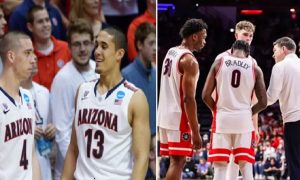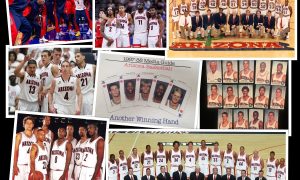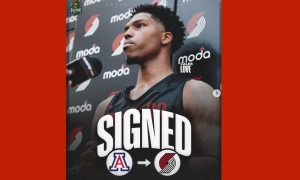Memo to Rawle Alkins: Those who leave Arizona early for the pros who do not get selected in the first round more often than not are in for trouble enjoying a prolonged NBA career.
Judging from the history of Arizona’s program, not considered a draft-worthy prospect by scouts, reserve forward Chance Comanche is in for the fight of his life to make it where most young players want to be — the NBA.
If Alkins leaves early and goes past the first round — he is not projected to go in that round — he also will play with fire.
The unsuccessful rate for those early entrants who go past the first round dates back to 1974 when Coniel Norman declared hardship — the term used back then based on an athlete’s financial situation — and was taken in the third round. He played only 99 games over a little more than three seasons in the NBA.
His teammate, Eric Money, did the same thing in 1974 and lasted six seasons after his second-round selection. Money is an exception as is another second-round pick, Gilbert Arenas in 2001, of finding a decent career despite going past the first round. Arenas lasted 11 seasons in the NBA and was once a high-scoring All-Star.
Chase Budinger lasted seven seasons in the NBA after his second-round selection in 2009 following his junior season. He played this season in Spain after earning more than $18 million from his time in the NBA. He can be labeled a success, although his NBA career did not pan out entirely as he wanted.
Unfortunately, for every Money, Arenas and Budinger, there are twice as many players who could have enhanced their career if they stayed longer with the program.
The valid argument can be made that outsiders do not live the lives of those who leave early. It’s their decision. It’s their life. That’s totally understandable.
This is an article just pointing out the difficulties facing those early entrants who are drafted beyond the first round.
Those second-round draft entrants who left early did not last long in the NBA include:
Michael Wright (never played in the NBA), Marcus Williams (played only 13 games in two seasons), Grant Jerrett (only eight games in two seasons in the NBA and is now in China), Nick Johnson (played in 28 games in less than two seasons and is in Germany) and Brandon Ashley (was not drafted and did not play professionally this season).
Johnson stuck around through his junior season, when he earned Pac-12 player of the year honors. His early departure is understandable — he reached his pinnacle in college as a player of the year talent — although a return for his senior season could have brought more accolades and prestige to his career at Arizona.
Wright, Williams, Jerrett and Ashley are examples that Alkins must think about. Williams and Jerrett were especially controversial early entrants in which it was shocking to hear the news of them going pro. Comanche, a reserve player like Jerrett, is the most surprising because he is not close to being fully developed.
Wright, Williams, Jerrett and Ashley combined for only 21 games in the NBA. Wright and Ashley never reached that far. Jerrett played in eight games over two seasons. Williams was in only 13 games in the same time frame. Similar to Jerrett, he wound up in China.
The late Wright enjoyed a long illustrious pro career in Turkey. A “tweener” at power forward, undersized at that position and without small forward skills, likely meant an NBA career was not in the cards had he stayed his senior year. But his education would have continued.
Kobi Simmons is banking on flourishing with a potential second-round selection.
Comanche made up his mind and is gone without an invite to the NBA scouting combine next week.
Alkins is in the process of getting feedback from NBA scouts heading into the combine in Chicago next week. Simmons will also participate.
Arizona’s recruiting outlook is on hold while Alkins decides. The route Alkins takes could affect the decision of Pitt graduate transfer Cam Johnson, who visited Arizona’s campus this week.
Sean Miller said earlier this week that he and his staff are preparing for life without Alkins.
“Our total responsibility, especially myself, is to run our program and make sure we’re going to be the best we can be regardless of what happens this spring,” he told Bruce Pascoe of The Arizona Daily Star.
If Alkins enters the draft despite forecasts of a second-round selection, if that, then he is fighting history. That is not a fight often won.
ARIZONA’S HISTORY OF EARLY NBA DRAFT ENTRANTS
DYr = Draft year. Length = Length of NBA career
[table “” not found /]


















